- Home
- Beth Gutcheon
Good-bye and Amen Page 17
Good-bye and Amen Read online
Page 17
Monica Faithful The church told me I could stay in the rectory for as long as I needed to after Norman left town, but they were being polite. Norman went off to the dry-out place, the same one Beccy went to, and he had a wonderful time. To this day I don’t believe he’s an alcoholic, he just needed something to blame besides himself. It was a whole new conversation for him, Norman the fallen, Norman the sinner, whose position is that in Christ, we’re all forgiven in advance. He wasn’t responsible for anything, it was the addiction, the sickness, that had screwed all those women and robbed his own church. You know how they say that at AA meetings everyone is laughing and down the hall at the Al Anon meetings, their wives and children are in tears? It’s true, and it’s not funny.
Oh wait, this part is funny. When he decided to go to the dry-out bin, he asked me to pay for it.
By Christmas I had moved into a little apartment down near the river. Near the train tracks, but on the right side of them. (That’s a joke.) It was tiny and shoddily built, but clean and fairly new. I hadn’t lived alone since the year in Cambridge when Norman was waiting for his divorce. Oh God—Rachel. Would she talk to me now?
I put most of my things in storage. I left Norman’s stuff in the rectory; let him deal with it. Let Mother Tautsch give it all to the rummage sale.
Jeannie wanted me to get out of town, go to New York, but I had to at least finish the year. This was my town too. I did have my work here, my friends, I was more than the minister’s wife.
Oh, that’s baloney. I stayed because I was too hurt and angry and addled to make sensible plans. It was a class-B miracle that I could get dressed in the morning and get through my workday. It did mean that I had no effing idea what to do about Christmas, and we do still have children.
In the end, I took Edie and Sylvia to L.A. to be with Jimmy and Josslyn. Their house was full; Josslyn’s mother and sister were there. We stayed at a bed-and-breakfast a few blocks from them. Josslyn was lovely about having us all. It was better; her house, her style, her turf. Sam was with us as much as he could be and that was very good for the girls. All three of them were livid at their father.
Sylvia Faithful I admit it. I became a Buddhist to embarrass my father. He was a god to me and it was uncomfortable. But tell me I’m wrong. Buddhism is all about doing away with troublesome ego. How can you go to St. Peter’s in Rome and not say that if Jesus walked in here and saw all these statues of dead popes and their marble and gold sarcophagi, he’d think it was demented?
Edith Faithful Someone said Buddhism is better than Christianity because it gets away from the Neolithic craving to gloat over human sacrifice. How about gloating, period?
Josslyn Moss I liked having Monica as a guest. She helped in the kitchen. She asked me how I liked to do things. She taught Boedie to play “Heart and Soul” with her on the piano, and she and Jimmy played some four-hand sheet music they found in the piano bench. Jimmy had only recently started playing again. I guess the music belonged to Aunt Nina.
Monica Faithful We sight-read Dolly, the Fauré suite. At least I was sight-reading. Jimmy was doing his part by ear. I caught him when I didn’t turn the page in the right place, and he went right on playing. It made me laugh. God, he plays like an angel.
We took long walks in the sun on the Santa Monica pier. I asked Jimmy how Norman could have done what he did. Someone much nicer than I am had told me some elaborate theory that when you’re seen as this God-like person but you know that you’re human and flawed, you have a need to be found out.
Jimmy listened with that sweet, mild steadiness he has these days, like someone who’s been to the moon and knows what it’s really made of, but knows it’s no use telling the rest of us. He just watches, and helps if he’s asked to. So I asked how a man of God, whose whole life is supposed to be a model of goodness, could do what Norman did, and he said, Oh that’s easy. Charisma is amoral.
Charisma is amoral. If you have it, you may think at first it’s some gift from a higher place that you’re supposed to use in a special way, but once you recognize it’s much simpler than that, you can do anything you want. And when you see that the world’s usual limits don’t apply to you, your choices get really interesting.
Bobby Applegate Jimmy called me after Christmas to ask if El would sell her part of Leeway Cottage to him. We had a huge family powwow about it.
Eleanor Applegate The children didn’t like it at all. I was surprised at how much they cared. They loved being able to spill over into Leeway when our house is full, the way they could with Monica in it. They clamored about their summer birthdays there, with their grandparents on the porch and the kids playing Capture the Flag in the field below all afternoon. They love those huge family dinners with everyone at one table. Adam and Alison want to be married there.
Bobby Applegate I thought, now wait. Is this a matter of being in love with your own childhood? Change is good. Or change is real. People die. Things end.
Eleanor Applegate I certainly had as many bad memories of that house as good ones. Jimmy probably had the fewest bad ones. And as I said, we wanted to build a guesthouse at the Salt Pond.
Bobby Applegate Of course, Jimmy has the fewest memories of any kind from his childhood, let’s be honest. A lot got lost in the fire.
Eleanor Applegate While the subject was on the table, we went to St. Louis. Bobby’s nephew was getting married. It was a beautiful wedding. Of course. The children stayed to dance, but Bobby and I went back to our hotel after the cake was cut. Weddings always make me cry, all that youth, all that hope. Bobby carries an extra handkerchief for me at weddings, because I forget I’m going to cry, but he doesn’t. At the hotel, there was some sort of wingding going on, a Sweet Sixteen maybe. We were holding hands as we walked through the lobby, and two girls with braces on their teeth, all dressed up, ran after us to the elevator. They said, “Wait—how long have you been married?” We said thirty-six years. “What’s the secret?” they wanted to know. (That’s when we realized we were holding hands.) I was about to say Never Marry a Man Who Hates His Mother, but Bobby answered first. He said, “Marry someone who makes you laugh, who will never betray you.” And he meant me.
A lot has been all my way for a lot of years. So when we got home I asked him what he wanted to do about Leeway, and he said, “Sell to Jimmy.” So we did.
Monica Faithful El had told me in February that Jimmy had bought her out and what he’d paid for her share. I waited for him to call about mine. I felt bereft; I mean, I was already so bereft I thought it was going to kill me to lose Leeway too, but life seems to practice an economy of pain. Pile it all on at once, see how long it takes you to snap. I couldn’t provide a place where all my children could celebrate Christmas or Hanukkah or the winter solstice together, and now I wouldn’t be able to provide a place in the summer either. And I’d felt stretched to breaking before that. I couldn’t pray. My nights were so long and bleak, I can’t tell you. The children would be devastated. I’d failed the three of them in so many ways. How would I keep them together as a family without Dundee? And where would home be for me now?
Josslyn Moss I waited until about March to bring up the subject of Leeway Cottage. I said, “Jimmy, Christmas was fine, but I can’t share the house again with your sisters.” He said, “I know.”
Monica Faithful In early March, Norman’s mother died. Died on March Hill, they say in Dundee. They get through Christmas, they even get through February, our old ones, but then March comes and there’s still no spring and it’s too much to bear. I thought of that, and pictured Hazel, halfway up a hill in patchy snow, with the rocks underfoot glazed with ice and the wind blowing at her baggy skin and her blind old eyes, saying, “No, I’ve had enough of this.” I know she died in her bed at the nursing place, with rails on the sides like a baby’s crib, and a glass on her tray of that horrible thickened water that she had to drink because regular water went down the wrong tube and made her choke…it’s truer to see her splayed out on the path up a hill t
oo steep, having chosen to say, “Stop. I’m done.”
Norman called me in tears, to ask me please to come to the funeral. I went, much more for the children than for him. It was a bleak little business in the chapel of the nursing place. Just me and Norman and the three children, and a handful of nurses and of Hazel’s most recent friends, in wheelchairs and walkers, probably there more because it was a festive outing for them than because Hazel had made an impression. She’d outlived everybody in her outside world except us. The nurses were very kind, though. They told us stories of happy moments in her last days. They seemed generic, except that one admitted Hazel had been quite exercised about another patient, an old gent who kept wandering into her room and putting his sweater into her drawers.
I guess that never ends.
Sylvie went right to the airport and back to New York after the service, but Edie and Sam and I stayed to help Norman pack up Hazel’s belongings. We had dinner together, and afterward Norman asked me to sit with him. He talked about what it was like to be sober for the first time in years. He talked about spiritual renewal, and how alone he felt in the world without a church home, without his mother, without me. He cried a lot and apologized a lot.
Eleanor Applegate And of course he asked her to take him back. I said, “Monica, tell me you’re not even thinking about it.” She told me she wasn’t. But she was lying.
Jeannie Israel It’s very hard to break the habit of trying to make the world right for someone you’ve loved. It’s especially hard if you’re a mother, and you’ve spent decades with those emotional habits of loving and protecting your children. When someone like Norman appeals to those same instincts, it’s like turning your back on your best self to say no. Especially if without him, you don’t know what you have or who you are. Norman is a genius at understanding that sort of weakness in people.
Monica Faithful Then I got a big envelope from a lawyer in Los Angeles, which said in about thirty-five pages of boilerplate and three sentences I could actually read, that Jimmy had given Leeway Cottage to me.
Josslyn Moss At first I was poleaxed. I said, “Why the hell would you do that? I love that house! The children love that house! Regis has this little ivory elephant he found there that he’s carried around with him so much he’s broken the tusks off!” Jimmy said, “I thought it would do the greatest good for the greatest number.” I said, “I know that’s a quote I’m supposed to recognize, asshole.”
Jimmy Moss I told her if it made her too unhappy, we wouldn’t do it. Nika would give it back.
Josslyn Moss Actually, I knew she would, if we asked.
Virgil wandered in, and he and Jimmy sat at the piano and sang their new theme song, from some record that came out of our boxes from Connecticut. It’s called “Nobody Ever Wants to Court a Warthog.” Virgil is starting to play by ear like his dad, and they made me laugh.
After the kids were in bed, Jimmy said, “Don’t forget, something in the house pushed Regis down the stairs.” I said, “You don’t believe that.” He said, “Actually, maybe I do.”
I waited for the real reason. Jimmy doesn’t like to spell things out, but I wanted more than a ghost story. But I didn’t get it.
What are you going to do? I knew what he was like when I married him.
An interesting development. Norman has started using a Ouija board. He got the idea from some woman he met at the dry-out place, whom he’s keeping company with. He started by wanting to talk to his mother. But instead he’s got someone very old and canny, who’s given her name as Sarai. She told him Hazel’s spirit has already been reborn, to a Mexican mother in Fort Worth. Gave a lot of details about how to find the baby. Didn’t go so far as to offer stars to guide him there, but it’s enough to keep him busy.
He keeps asking if there’s anyone here called Jesus Christ. Sarai gives him puzzle answers. If there were such a being he wouldn’t call himself that. If there were such a being he wouldn’t be here. That sort of thing. To each according to his needs.
Who is here? As I’ve said. New arrivals, those in transition. And we who are not going anywhere.
It’s true that there are many mansions. Very many. And there are some of us who are built to serve. It’s what we’re made of, it’s what we chose. We arrived like the others, but we don’t go on. We stay, to help and guide at the moment of maximum confusion.
No. It isn’t sad for us. Oh, maybe it is, a little. Was at first. But there are so many compensations. We do have fun.
BIOGRAPHIES OF CONTRIBUTORS
Adam Applegate, son of Eleanor and Bobby Applegate, is twenty-nine. He attended the University of North Carolina at Chapel Hill, then law school at University of Virginia. He currently practices tax law in Washington, D.C., at the firm of O’Melveny & Myers. He is learning to cook Chinese food, which he especially enjoys because of all the manly chopping with big sharp knives.
Annabelle Applegate, known as Annie, is the oldest child of Eleanor and Bobby Applegate. She is thirty-two. She went to Middlebury College, where she majored in French. She manages the office of a Boston architect and belongs to the Junior League of Boston and to her mother’s Topics Club, which she particularly enjoys. She is most proud of having finished the Boston Marathon in under four hours, and would like to live in France for a year.
Bobby Applegate married Eleanor Moss in 1964. An investment banker, president and CEO of Applegate Brothers, Ltd., where he feels only slightly under the thumb of the chairman of the board, his older brother Terry. He grew up in Rye, New York, and graduated from Georgetown. Can play guitar, banjo, and trombone, and still sometimes regrets that he never tried to make it playing rock and roll. John is his favorite Beatle.
Henrik Charles Applegate, called Charlesie, youngest child of Bobby and Eleanor Applegate, is almost nineteen. He has spent a lot of time in the Opportunity Room at school, and couldn’t do math if you put a gun to his head, but he can read the wind on the bay like a private language. He would like to be a professional sailor and crew in an America’s Cup, and also to sail in the Whitbread Round the World Race. If he can manage to finish high school, he hopes to go to the Maine Maritime Academy in Castine.
Eleanor Wells Moss Applegate, oldest daughter of Laurus and Sydney Moss, was born in Dundee, Maine, in August of 1942. She eloped with Bobby Applegate during her senior year at Skidmore. She completed a master’s degree in history of art, hoping to go into museum work, but in the end settled for a lot of volunteering. She particularly likes the following cultural truism: What’s the ultimate status symbol? Answer: four kids and a wife who doesn’t work. She hopes she can talk her husband into working less and traveling more once Charlesie goes to college. She would like to spend an entire week in the Scuola Grande di San Rocco in Venice, and another in the Prado in Madrid. She is especially proud of her Topics Club, which she keeps on the straight and narrow in spite of the tendency of some of the older members to pay Harvard students to write their Topics papers.
Nora Marion Applegate, younger daughter of Eleanor and Bobby Applegate, just turned twenty-one. As a girl she was passionate about competitive horse show jumping, which she was forced to give up when her mother refused to spend her life trailing around to horse shows from Boston to Florida. She will graduate from Brown with a degree in English literature and would like to live in New York City or San Francisco, or to go to the Iowa Writers’ Workshop or else film school. She is also interested in journalism. Biggest unrealized dream: to disguise herself as a boy and ride a racehorse like Elizabeth Taylor in National Velvet. Also, she plans to finish the family photo archive she’s putting on DVD for everyone as soon as she can get to it.
Trinny Biggs, Sandusky, Ohio. Manager, Second Acts, a store for lightly used children’s clothing. Formerly a homemaker in Sand Hills, Oregon. Currently supervising care for her elderly parents. Proudest accomplishment: winning second prize in the local newspaper’s biannual quilt contest for her original appliqué pattern quilt called Hawaiian Luau. She would like to visit Honol
ulu.
Benedikte Bastlund is a lawyer in Copenhagen. Married to Iain McCallum, a Scottish professor of maths. They have three grown children, all living in Denmark. Her favorite pastime: golf vacations in Scotland.
Alison Boyd grew up in New York City, partly raised by her grandmother when her mother became ill. She graduated from Wheaton College and is currently working at the Renwick Gallery in Washington, D.C. She met Adam Applegate at a wedding in Richmond. Her proudest accomplishment: she overcame her fear of flying and went skydiving. Once. She especially likes summer storms in Washington, when the sky turns purple-green.
Kendra Brayton is retired. She lives with her husband in a gated senior community in Orange County, California. She enjoys visiting her grandchildren. She swims fifty laps in the pool at least four times a week, and walks briskly with two girlfriends on the other days. She has organized progressive dinner parties where you have a different course at each person’s house, and enjoys a trip to Las Vegas twice a year. Her favorite first lady was Barbara Bush.
Owen Cantwell is long retired, but his firm keeps an office for him and he goes in every day. He counsels the young associates, though more and more they seem to him like children masquerading as lawyers. He and his wife have passed their sixty-fifth anniversary. He can see and she can hear, which works out pretty well. He is too old to have a favorite Beatle but believes you would have to go a long way to do better than the score of Oklahoma!
Rosella Cherry lives in Sweetwater, Pennsylvania. Grew up in Aliquippa, Pennsylvania, daughter of a steel worker. Briefly married, has one daughter living in Australia, who is an otologist. She was the longtime one-woman sales force for the town’s only bookstore, now defunct. Retrained for office work at a local business college and is now church secretary at Good Shepherd Episcopal. She also sings first alto in the choir. Paul is her favorite Beatle.

 The Affliction
The Affliction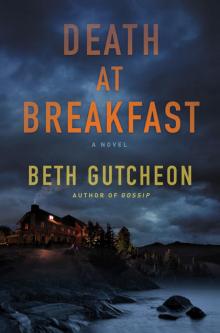 Dead at Breakfast
Dead at Breakfast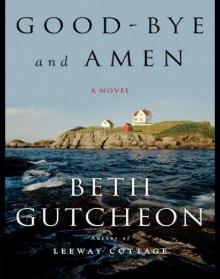 Good-bye and Amen
Good-bye and Amen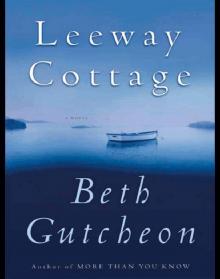 Leeway Cottage
Leeway Cottage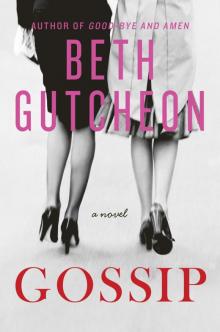 Gossip
Gossip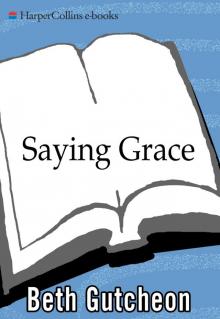 Saying Grace
Saying Grace